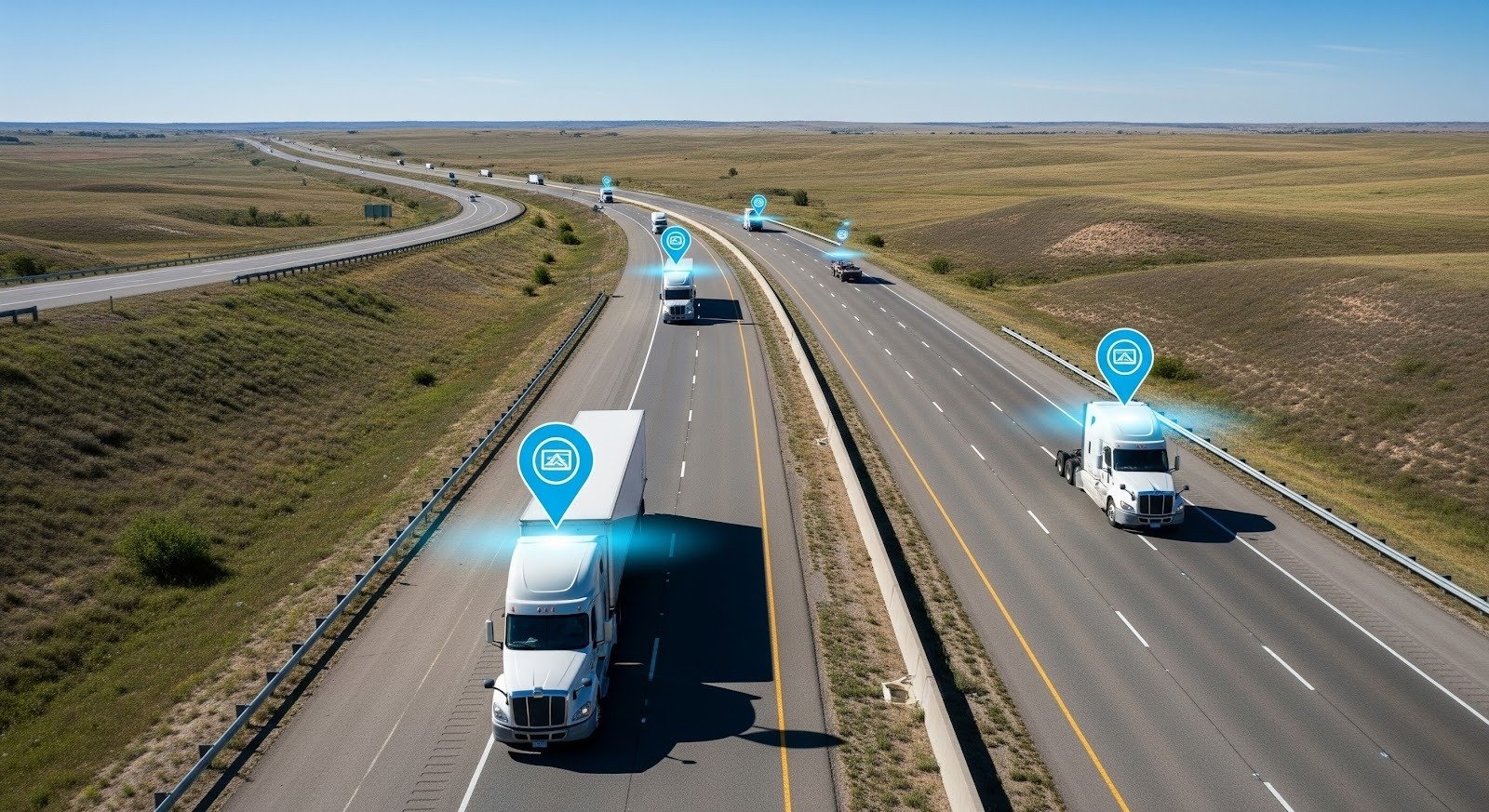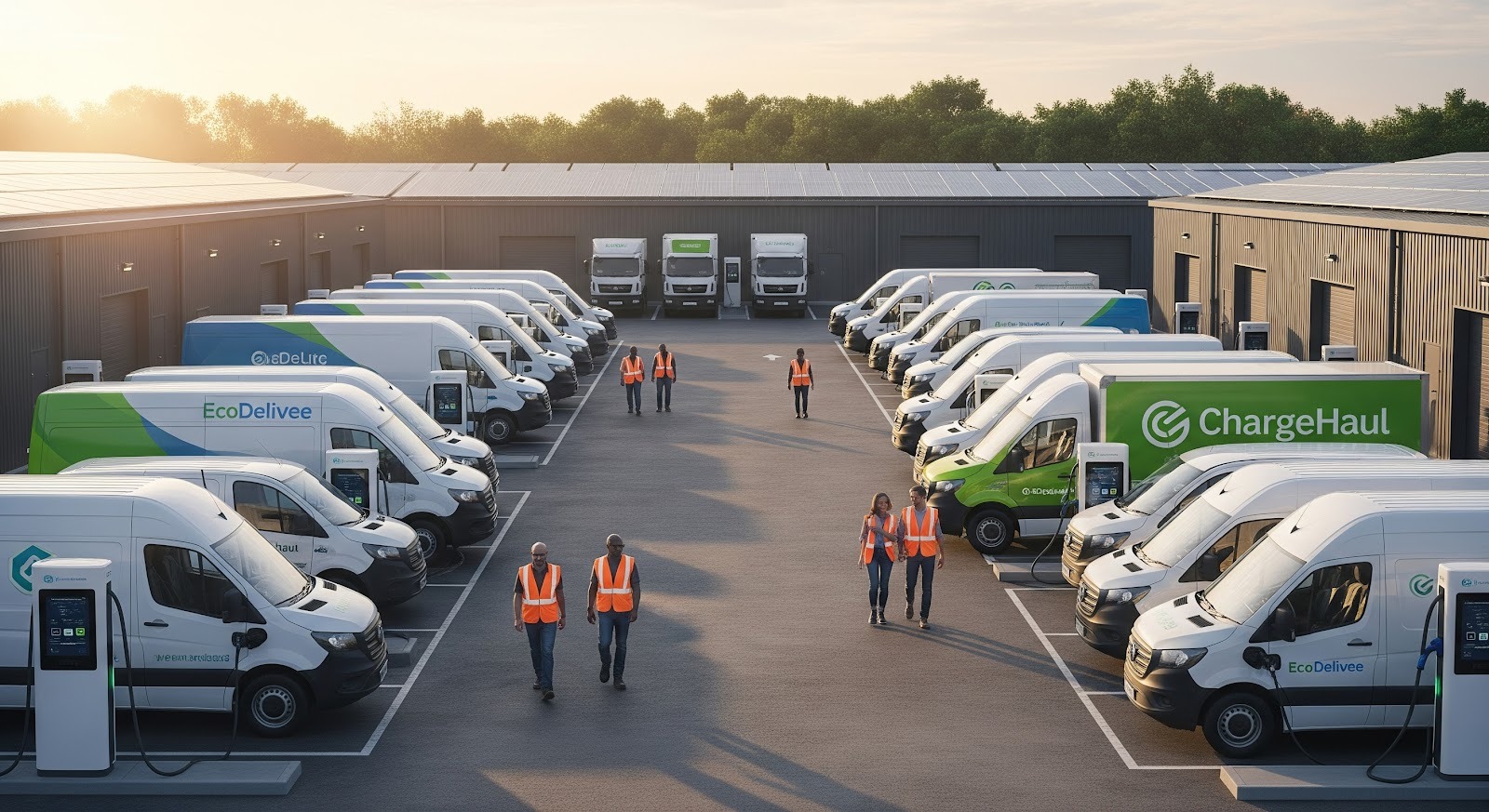Geofencing for Fleet Tracking: Boost Control & Efficiency
Geofencing is quickly becoming a go-to tool for modern fleet managers who want better control, efficiency, and visibility over their operations. By...
Keep an eye on the road
Simplify your driver's routine
For efficient decision making
Ensure the compliance of your fleet
Simplify the daily life of your drivers
Maximize the value of your data
Unparalleled monitoring of your assets
The friendly competition that pays off
Planning powered by data
Exceed your customers' expectations
Provide better service to your users
Maximize the satisfaction of your citizens
Simplify your daily life on the construction site
Facilitate the electrification of your fleet
Our experts meet your needs
Easily meet the standards
Improve the safety of your drivers
Protect your data and your fleet
6 min read
AttriX
Jul 31, 2025 12:00:00 AM

Today’s approach to fleet vehicle management is a far cry from what it was even a decade ago. It’s no longer just about keeping track of where your vehicles are and when they need servicing. Now, it’s about tapping into a rich stream of data—from fuel usage to driver behaviour—to make smarter decisions every day. By weaving in business intelligence, telematics, and sustainability tools, companies are not just managing fleets; they’re optimizing operations from top to bottom.
Managing a fleet means understanding the full journey of every vehicle. From when it's brought into service to the day it's retired, knowing how it's used and where it is at all times is key. Asset tracking tools offer real-time visibility that helps you make informed decisions—whether that’s scheduling maintenance or reallocating underutilized assets.
Relying on set maintenance intervals doesn’t always cut it. Predictive diagnostics, powered by telematics, let you catch problems before they lead to breakdowns. You’ll spend less time and money on emergency repairs and more time keeping your vehicles on the road where they belong.
Fuel expenses add up fast. With fuel management tools, you can track consumption by trip, vehicle, or driver. This helps you identify problem areas—like inefficient routes or habits like idling—and take corrective action to keep costs down.
Staying compliant with driving hours, inspections, and certifications isn’t optional—it’s essential. Smart fleet tools automate much of the paperwork and send real-time alerts so you can handle issues before they snowball into bigger problems.
Efficient dispatch and route planning save more than just time—they save money, too. By using GPS data and traffic insights, fleet managers can create routes that minimize delays and cut fuel usage while still meeting service commitments.
Being able to see where every vehicle is at a glance changes the game. Whether it’s rerouting a driver to avoid traffic or confirming a delivery, real-time GPS tracking provides the transparency and agility needed for quick decisions.
Speeding, harsh braking, or long idling times? Telematics reveals these patterns. With this data, you can tailor coaching efforts to each driver and build a safer, more efficient fleet over time.
Underused vehicles and excessive idling hurt the bottom line. Usage analytics let you pinpoint inefficiencies so you can make smarter choices—like whether to downsize, reassign vehicles, or adjust routes.
Business intelligence tools turn telematics data into actionable insights. Dashboards and automated reports highlight trends you might otherwise miss, helping you plan better and act faster.
Instead of reacting to breakdowns, predictive systems let you stay one step ahead. Based on real-time and historical data, these tools identify likely points of failure so you can fix issues before they interrupt operations.
With a clear view of who’s burning more fuel and why, you can introduce strategies—like better routing or driver training—that lead to real, measurable savings.
Automating compliance tasks not only reduces human error but also ensures your records are always audit-ready. Timely alerts and digitized forms make compliance part of the everyday workflow.
For fleets aiming to cut emissions, detailed reports help you track your environmental impact and identify where to improve. It’s not just good for the planet—it also supports your sustainability goals and reporting requirements.
Instead of using a one-size-fits-all schedule, automated systems tailor maintenance based on each vehicle’s usage and condition. It’s smarter, more efficient, and easier on the budget.
With remote diagnostics, you don’t need to wait for a vehicle to come back to the depot to find out something’s wrong. Telematics can flag engine faults and other issues in real time so you can respond immediately.
Downtime is expensive. Predictive alerts, fast diagnostics, and organized maintenance schedules all contribute to higher uptime and more reliable fleet performance.
Fuel prices can vary widely depending on the location. Tracking systems help drivers refuel at the most cost-effective spots, especially on long hauls.
Some platforms even integrate fuel pricing into route planning, ensuring your vehicles take the most efficient and affordable paths.
Optimized routes aren’t just faster—they’re greener. Reducing idling and unnecessary detours cuts down on emissions, supporting both environmental goals and operational savings.
Driver analytics provide a clear view into on-the-road behaviour. These insights help you coach drivers effectively, reduce accidents, and improve fuel efficiency.
Turning performance into a game—with scorecards or friendly competitions—can boost engagement and encourage safer habits behind the wheel.
When safety becomes part of daily conversation and expectations are backed by data, it creates a workplace where rules are followed, and risks are minimized.
Not every vehicle is a fit for electrification. Telematics helps spot the best candidates by analyzing mileage, routes, and usage patterns.
Detailed trip data makes it easier to plan charging infrastructure and ensure electric vehicles can complete their routes without interruption.
BI tools can project how much fuel and emissions your fleet could save by going electric, helping you build a solid business case.
Monitoring battery performance in real time helps extend EV life and ensures reliability throughout each workday.
Operations centers rely on live dashboards to monitor everything from vehicle locations to urgent alerts. It’s the nerve center of modern fleet management.
Custom alerts keep your team informed about everything from rule violations to incoming weather issues, enabling fast and accurate responses.
Industrial-grade displays keep key metrics visible at all times, helping teams stay aligned and proactive, even during high-pressure situations.
Accurate logs are crucial for compliance. Automation removes manual entry errors and keeps you ready for audits at any time.
Digitizing compliance documents improves traceability and simplifies the process of preparing for inspections or reviews.
Real-time alerts help you fix non-compliance issues before they become costly mistakes.
By tracking cost trends and performance metrics, you can clearly see how technology investments are paying off.
The right data makes it easy to spot where things are going well—and where there’s room to improve.
With clean, visual reports, it’s easier to show how your fleet initiatives are delivering real results.
Integrating telematics systems like Geotab with Lighthouse enhances data flow and allows for deeper analysis.
A connected tech ecosystem streamlines communication, dispatching, and route planning—all in one place.
When all your data lives in one dashboard, decision-making becomes faster, smarter, and more effective.
Clean data is non-negotiable. Establishing solid data governance practices early makes every tool more effective.
Getting your team on board is key. Practical training and clear communication help ease the transition and increase usage.
Choose systems that grow with you. Cloud-based platforms ensure you’re ready for whatever the future brings.
AI continues to sharpen its ability to spot trends and offer real-time recommendations, making fleets more proactive than ever.
Though still emerging, autonomous tech and vehicle platooning have the potential to change how we think about logistics.
As tech advances and infrastructure grows, EV adoption will become not just viable—but strategic.
At AttriX, we offer more than just tools—we deliver insights. Our Lighthouse platform gives fleet managers real-time access to the metrics that matter: maintenance, fuel, compliance, and more. With these insights, you can make informed decisions that improve performance and reduce costs.
Our AttriX DX driver terminals bring clarity and efficiency to the field. Whether it’s logging inspections or communicating routes, these rugged devices work as hard as your team does. And with built-in Knox security, you can manage everything remotely and securely.
From supporting EV adoption to simplifying compliance, our solutions are designed to scale with your needs. AttriX helps you turn your fleet data into meaningful action—and measurable results.
It’s the process of overseeing vehicles, drivers, and operations to reduce costs, boost performance, and stay compliant.
They track behaviour patterns and provide coaching tools that help reduce risky driving and prevent accidents.
Absolutely. It cuts down on emergency repairs, avoids breakdowns, and keeps your vehicles running longer.
By looking at usage data like trip length and idle time, you can identify which vehicles make good EV candidates.

Geofencing is quickly becoming a go-to tool for modern fleet managers who want better control, efficiency, and visibility over their operations. By...

Fleet electrification is no longer just an idea for the future—it’s happening now. With climate targets getting stricter and public expectations...

Managing a fleet is no small feat. From keeping vehicles on the road to ensuring compliance with changing regulations, today’s businesses rely...